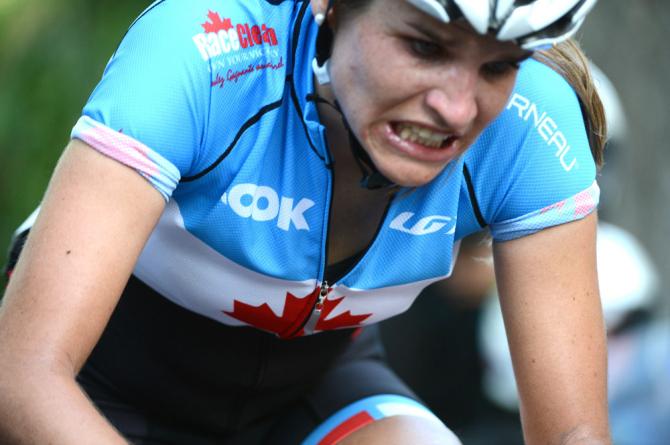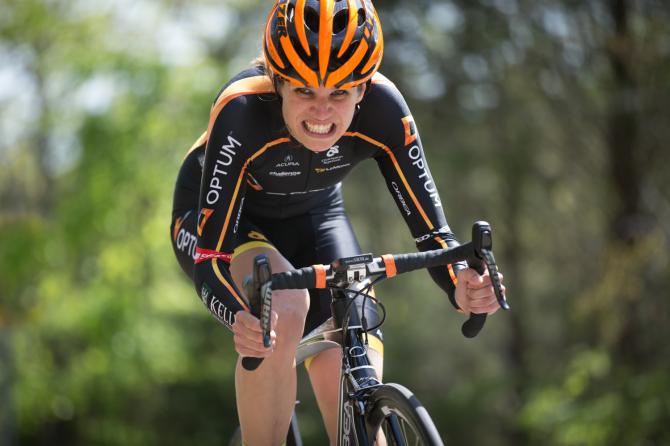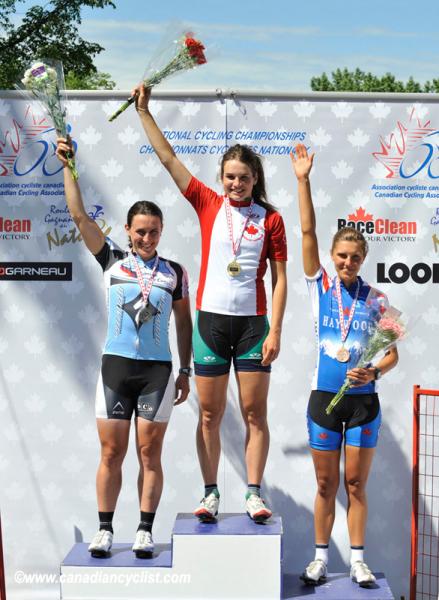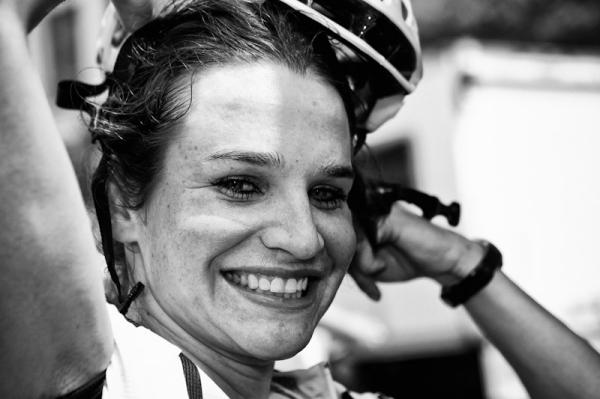Numainville sidelined from Canadian national road and time trial defense
Québécoise suffers from year-old concussion




Optum’s Joëlle Numainville was unable to defend her double national titles at the Canadian Road Championships this week in Lac-Mégantic because she is recovering from a concussion sustained at the 2013 Tour of the Gila. The injury was diagnosed seven months after it happened, and although the Québécoise is on the mend, she will not compete again this season until her doctor deems it safe to do so.
The concussion dates back to a high-speed crash that happened during the second stage of Tour of the Gila last May, on a descent in the Fort Bayard road race. Numainville’s body was jarred but she got up and finished the stage more than 17 minutes down, not realizing that she had a head injury. After a sleepless night, she woke up the next day feeling foggy but continued racing. “I didn’t think that I hit my head, it didn’t hurt but I felt like I was in shock,” Numainville said.
After several weeks of sleepless nights, her family doctor prescribed her sleep medication, which Numainville said knocked her out at night but made her feel groggy during the day. “I was taking the sleep medication, which was brutal, and I thought that was why I was feeling so weird during the day. I had no idea that I had a concussion”
Numainville continued racing through the summer with success. She was on the podium at the Grand Prix Cycliste de Gatineau and the Chrono Gatineau, was second at the Philly Cycling Classic, secured the national title in both the time trial and the road race, all within a month or two after the crash, and while feeling off mentally.
“I was out of it most of the daytime. It was hard but I got through the middle of the season,” said Numainville, whose performances in both training and racing began to suffer after the Tour Cycliste Féminin International de l’Ardèche in September. “I couldn’t recover from training. I started to notice this during my preparation for the world championships.”
“During the two weeks before worlds, I was dead and I never recovered,” Numainville said. “I was taking double the medication to help me sleep and it wasn’t working anymore and I was stressed out because I didn’t know what was going on. It was bad.”
Numainville took some time off during the fall and early winter months, and she slowly started to feel better. When her training threshold increased in December, however, she was back to sleepless nights and feeling foggy during the day.
Get The Leadout Newsletter
The latest race content, interviews, features, reviews and expert buying guides, direct to your inbox!
She stopped riding altogether and her family doctor requested she take a series of neuro-cognitive tests to help determine if she had had a concussion during the accident in New Mexico seven months earlier. Those results were compared to a series of similar baseline tests she had taken the year before, which showed impairment to some of her cognitive functions. The results were used to assess the level of concussion she may have had during the time of the crash.
“My results were really off and that’s how the doctors figured out that I had a concussion,” Numainville said. “My biggest problem was not being able to sleep, but I also had trouble in other areas. They were trying to be positive but at the same time they said it was a serious concussion. I didn’t even hit my head in that accident but my doctor said that you don’t have to hit your head to get one.”
She has taken much of the season off with the exception of competing at the Redlands Bicycle Classic and the Winston-Salem Cycling Classic in April, where she placed second. “Day after day, I was getting a little stronger and I was stoked about the podium in Winston-Salem but I couldn’t sleep again during the weeks that followed those efforts.”
Numainville is now back on her bike and has spent months working with her coach in the gym to avoid losing too much strength but she has no plans to return to the peloton until her concussion is fully healed.
“Concussions can be very tricky and it’s an area that even doctors aren’t sure about the best ways to recover. They’re also very scary. I won’t race again until I’m convinced that I’m healthy enough to race, until my doctor says it’s OK to race, because if I go down again, I could have long-term damage.”
Numainville’s says that she wasn’t too disappointed to have to skip the national championships this weekend. She was also happy that her Optum teammate Leah Kirchmann won the time trial title.
“I’ve been struggling with this for more than a year now and so if I’m going to come back to racing, I’m going to be back 100 per cent,” she said. “I just want to be healthy right now.
“I was following the time trial and it was really cool that Leah won because she’s been working really hard.”

Kirsten Frattini is the Deputy Editor of Cyclingnews, overseeing the global racing content plan.
Kirsten has a background in Kinesiology and Health Science. She has been involved in cycling from the community and grassroots level to professional cycling's biggest races, reporting on the WorldTour, Spring Classics, Tours de France, World Championships and Olympic Games.
She began her sports journalism career with Cyclingnews as a North American Correspondent in 2006. In 2018, Kirsten became Women's Editor – overseeing the content strategy, race coverage and growth of women's professional cycling – before becoming Deputy Editor in 2023.